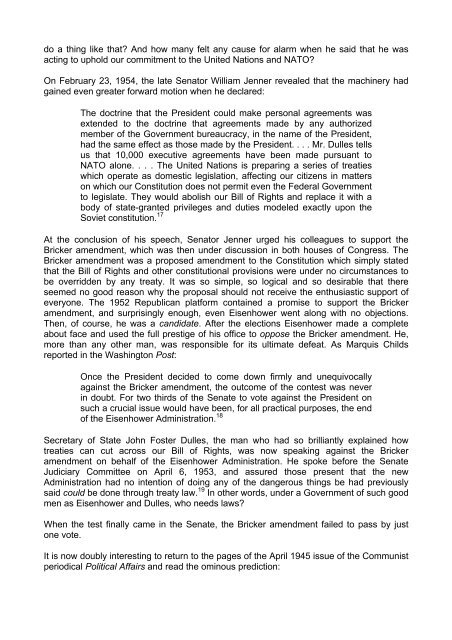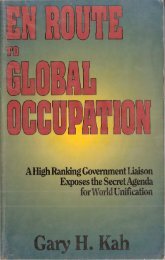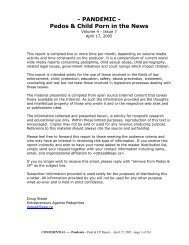G. Edward Griffin - The Fearful Master - PDF Archive
G. Edward Griffin - The Fearful Master - PDF Archive
G. Edward Griffin - The Fearful Master - PDF Archive
You also want an ePaper? Increase the reach of your titles
YUMPU automatically turns print PDFs into web optimized ePapers that Google loves.
do a thing like that? And how many felt any cause for alarm when he said that he was<br />
acting to uphold our commitment to the United Nations and NATO?<br />
On February 23, 1954, the late Senator William Jenner revealed that the machinery had<br />
gained even greater forward motion when he declared:<br />
<strong>The</strong> doctrine that the President could make personal agreements was<br />
extended to the doctrine that agreements made by any authorized<br />
member of the Government bureaucracy, in the name of the President,<br />
had the same effect as those made by the President. . . . Mr. Dulles tells<br />
us that 10,000 executive agreements have been made pursuant to<br />
NATO alone. . . . <strong>The</strong> United Nations is preparing a series of treaties<br />
which operate as domestic legislation, affecting our citizens in matters<br />
on which our Constitution does not permit even the Federal Government<br />
to legislate. <strong>The</strong>y would abolish our Bill of Rights and replace it with a<br />
body of state-granted privileges and duties modeled exactly upon the<br />
Soviet constitution. 17<br />
At the conclusion of his speech, Senator Jenner urged his colleagues to support the<br />
Bricker amendment, which was then under discussion in both houses of Congress. <strong>The</strong><br />
Bricker amendment was a proposed amendment to the Constitution which simply stated<br />
that the Bill of Rights and other constitutional provisions were under no circumstances to<br />
be overridden by any treaty. It was so simple, so logical and so desirable that there<br />
seemed no good reason why the proposal should not receive the enthusiastic support of<br />
everyone. <strong>The</strong> 1952 Republican platform contained a promise to support the Bricker<br />
amendment, and surprisingly enough, even Eisenhower went along with no objections.<br />
<strong>The</strong>n, of course, he was a candidate. After the elections Eisenhower made a complete<br />
about face and used the full prestige of his office to oppose the Bricker amendment. He,<br />
more than any other man, was responsible for its ultimate defeat. As Marquis Childs<br />
reported in the Washington Post:<br />
Once the President decided to come down firmly and unequivocally<br />
against the Bricker amendment, the outcome of the contest was never<br />
in doubt. For two thirds of the Senate to vote against the President on<br />
such a crucial issue would have been, for all practical purposes, the end<br />
of the Eisenhower Administration. 18<br />
Secretary of State John Foster Dulles, the man who had so brilliantly explained how<br />
treaties can cut across our Bill of Rights, was now speaking against the Bricker<br />
amendment on behalf of the Eisenhower Administration. He spoke before the Senate<br />
Judiciary Committee on April 6, 1953, and assured those present that the new<br />
Administration had no intention of doing any of the dangerous things be had previously<br />
said could be done through treaty law. 19 In other words, under a Government of such good<br />
men as Eisenhower and Dulles, who needs laws?<br />
When the test finally came in the Senate, the Bricker amendment failed to pass by just<br />
one vote.<br />
It is now doubly interesting to return to the pages of the April 1945 issue of the Communist<br />
periodical Political Affairs and read the ominous prediction:



![Robert T McQuaid [rtmq@stn.net] Sent: Friday, October 29, 2004 12 ...](https://img.yumpu.com/51070071/1/190x245/robert-t-mcquaid-rtmqstnnet-sent-friday-october-29-2004-12-.jpg?quality=85)







